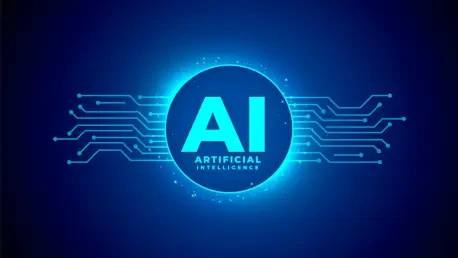Imagine a world where every advertisement feels uniquely crafted for the individual viewer, where campaigns are launched with pinpoint precision, and where marketing teams operate at unprecedented efficiency. This is no longer a distant vision but the current reality of digital marketing in 2025, powered by artificial intelligence (AI). The integration of AI into marketing strategies has revolutionized how brands connect with audiences, offering tools that automate tasks, personalize content, and predict trends with remarkable accuracy. This review delves into the transformative capabilities of AI in digital marketing, exploring its core features, real-world performance, and the implications for agencies and consumers alike.
Understanding the Role of AI in Marketing
At its core, AI in digital marketing harnesses technologies like machine learning, predictive analytics, and generative models to enhance strategic outcomes. These systems process vast amounts of data to identify patterns, forecast behaviors, and optimize content delivery. Unlike traditional methods that rely heavily on manual input, AI introduces a level of automation and insight that redefines campaign management. For agencies, this means the ability to focus on creativity and strategy while routine tasks are handled by intelligent algorithms.
The significance of AI extends beyond mere convenience, embedding itself as a critical driver of competitive advantage. In an era where consumer expectations demand instant relevance, AI equips marketers with the means to deliver tailored experiences at scale. Its role in the broader technological landscape underscores a shift toward data-driven decision-making, positioning it as an indispensable tool for staying ahead in a crowded market.
Key Features and Performance Metrics
Automation for Streamlined Operations
One of the standout features of AI in digital marketing is its capacity to automate repetitive processes. Tasks such as crafting ad copy, designing visuals, and scheduling posts are now executed with speed and consistency, thanks to generative AI tools. This automation enables agencies to manage expansive campaigns without the burden of manual oversight, scaling operations while maintaining quality. Industry reports highlight that such efficiencies have led to a notable boost in return on investment, with some metrics showing increases of up to 30%.
Beyond saving time, automation enhances precision in targeting and delivery. AI systems analyze real-time data to adjust campaigns on the fly, ensuring resources are allocated where they yield the highest impact. This capability proves invaluable for large-scale operations, where managing multiple client portfolios demands both agility and accuracy.
Personalization Powered by Data Insights
Another critical strength of AI lies in its ability to personalize content through sophisticated data analysis. Tools like chatbots and recommendation engines sift through extensive datasets to offer consumers experiences that feel bespoke. Whether it’s suggesting products on an e-commerce platform or curating social media feeds, AI ensures that interactions resonate on a personal level.
Predictive analytics further amplifies this by anticipating consumer needs and market shifts. By identifying emerging trends, AI allows marketers to stay proactive rather than reactive, particularly in dynamic sectors like retail. This forward-thinking approach not only boosts engagement but also builds trust, as consumers increasingly value brands that understand their preferences without explicit input.
Latest Trends and Innovations
The landscape of AI in digital marketing continues to evolve with cutting-edge developments shaping its trajectory. Cloud-based AI solutions have gained traction, offering scalable platforms that integrate seamlessly across channels. Virtual assistants, meanwhile, support omnichannel strategies by providing consistent customer interactions, whether through text, voice, or visual interfaces.
Emerging trends such as voice search optimization have redefined how brands reach audiences, aligning with the growing reliance on smart devices. Real-time data analysis also plays a pivotal role, enabling instantaneous campaign adjustments based on live feedback. These innovations reflect a broader movement toward dynamic, responsive marketing that prioritizes immediacy and relevance.
Investment in AI remains robust, with its economic impact projected to grow substantially from 2025 to 2027. This financial commitment signals confidence in AI’s potential to drive marketing efficiencies on a global scale, particularly in regions like India, where digital ad spending is experiencing rapid expansion. Such trends highlight the technology’s role as a cornerstone of modern advertising strategies.
Real-World Impact and Case Studies
Across industries, AI’s practical applications in digital marketing are evident, with agencies leading the charge in implementation. From optimizing social media presence to refining search engine strategies, the technology delivers measurable results. Its adoption has reshaped consumer engagement, setting new benchmarks for campaign effectiveness and brand interaction.
Specific examples underscore this impact. Agencies like NinjaPromo leverage neural networks to fine-tune social media content, achieving higher engagement rates through data-driven adjustments. Similarly, Consultus Digital employs AI for search engine optimization, using predictive tools to anticipate algorithm updates and maintain client visibility. These cases illustrate how tailored AI solutions address unique challenges, enhancing performance metrics.
The broader influence on industry standards cannot be overlooked. As agencies pioneer innovative uses of AI, they establish best practices that others follow, fostering a culture of continuous improvement. This ripple effect ensures that the benefits of AI extend beyond individual campaigns, elevating the entire marketing ecosystem.
Challenges in Implementation
Despite its advantages, adopting AI in digital marketing comes with notable hurdles. High implementation costs pose a barrier for smaller agencies, requiring significant upfront investment in infrastructure and expertise. Additionally, skill gaps within teams often hinder effective deployment, as staff may lack the technical know-how to maximize AI tools.
Ethical concerns also loom large, particularly around data privacy and algorithmic bias. Ensuring compliance with regulations like GDPR is paramount, as is the need for transparent frameworks that build consumer trust. Agencies must navigate these issues carefully to avoid reputational risks associated with misuse of personal information or unfair targeting practices.
Efforts to address these challenges are underway, with partnerships and upskilling programs gaining momentum. Hybrid models that combine AI with human oversight offer a balanced approach, preserving the creative essence of marketing while leveraging technological precision. Such initiatives aim to make AI more accessible and responsible across the board.
Future Prospects and Industry Evolution
Looking ahead, AI’s trajectory in digital marketing promises even greater personalization and efficiency through ongoing innovations. Advances in natural language processing and machine vision could further refine how content is created and delivered, offering hyper-specific targeting capabilities. These developments suggest a future where marketing feels less like promotion and more like a natural dialogue.
The long-term impact on global ad spending appears substantial, with AI expected to drive significant growth in digital channels over the coming years. This shift will likely deepen consumer connectivity, as brands harness AI to forge stronger, more meaningful relationships. Agencies, in particular, stand to play a pivotal role in shaping these tools to meet evolving demands.
Adaptability remains key, as the pace of technological change shows no sign of slowing. The ability to integrate emerging AI functionalities while addressing ethical considerations will define success in this space. As the industry moves forward, a focus on innovation balanced with accountability will ensure sustainable progress.
Final Reflections
Reflecting on this comprehensive evaluation, it becomes clear that AI has fundamentally altered the digital marketing landscape with its robust automation, personalized outreach, and predictive prowess. Agencies have embraced these tools to achieve remarkable gains in efficiency and engagement, setting a high bar for industry standards. Challenges like cost and ethics have been acknowledged, with proactive steps taken to mitigate risks through training and transparent practices.
Moving forward, the emphasis should be on democratizing access to AI technologies, ensuring smaller players can compete alongside established firms. Exploring collaborative platforms and open-source solutions could bridge the resource gap, fostering inclusivity. Additionally, a sustained commitment to ethical guidelines will safeguard consumer trust, paving the way for AI to redefine marketing as a truly consumer-centric endeavor.









